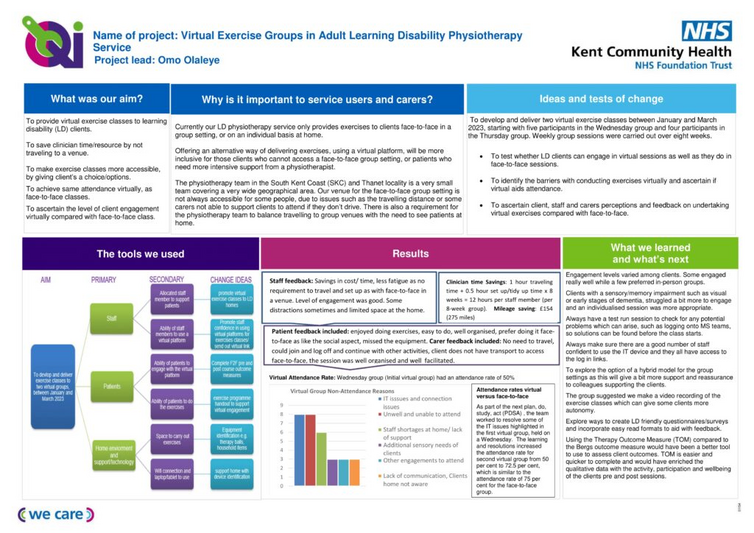Always keen to look at new ways of supporting those who use services at Kent Community Health NHS Foundation Trust (KCHFT), a trial was held to see if adults with learning disabilities would benefit from virtual exercise classes.
Clinical Lead Physiotherapist Omo Olaleye wanted to see if they would be as effective as face-to-face and she also wanted to make them more accessible.
At the same time, the team was looking at ways of improving waiting lists, saving time, reducing costs and the environmental impact of colleagues and clients travelling.
Omo first tried virtual exercise classes at a residential home in Margate and then at one in Ramsgate, with the team covering the Thanet and south Kent coast areas. With these sessions being successful, the idea was then tested with more people living in the community.
Virtual classes made attendance easier for those who could not or did not want to travel to a venue. However, some missed the social aspect of exercising with others. What Omo found was that a one-size-fits-all approach did not work and offering different options, for people’s varying needs, was the best way forward.
Omo said: “For some, it worked well. For instance, we had someone who struggled to take part due to their mental health and couldn’t go out, so virtual meant we were able to engage and support more frequently, with us not spending time on travelling. We had one lady who lived in Thanet and the exercise class we offered at the time was in Capel-le-Ferne near Folkestone, so offering it virtually was better for her.
“There was mixed feedback. One person said they liked the virtual session and it was fun, but someone else said they found it boring and missed the equipment we provide at face-to-face group sessions.
“Being able to offer these classes means we can be more flexible and for some virtual is best for them, but for others it is not, which is why we will continue to offer a mixture, so that we can try to meet the needs of everyone. The trial showed us that virtual classes can work well for some.”
Next, the team is considering recording exercise sessions and posting them online, so that people could do them at any time.
A quality improvement (QI) approach was used to try the new way of working, with Omo setting a smart aim and using QI tools including a driver diagram.
Omo said: “It was suggested to me that I should use a QI approach and at first I was worried that this might mean more work. However, I got in touch with the QI team and the QI advisor Jo brought the ideas to life. I now feel confident to do another QI project, as the support is there.”
See Omo's project on a page on KCHFT's QI website HERE


